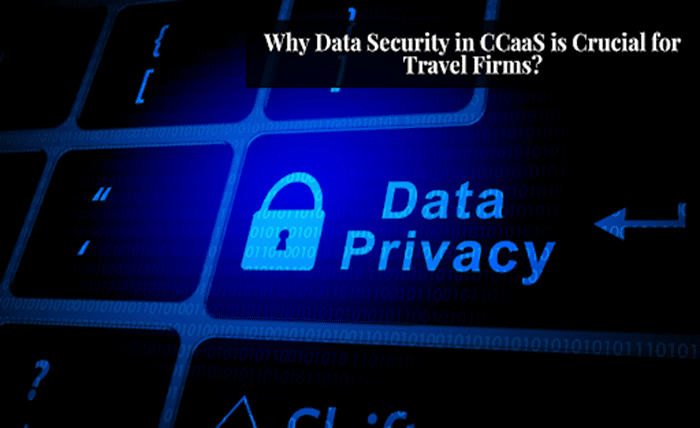Why Data Security in CCaaS is Crucial for Travel Firms?

Travel firms today are dependent on technology to manage customer interactions and deliver seamless travel experiences in this digital world. Today, a large number of companies are turning towards Contact Center as a Service (CCaaS) solutions to handle their customer service needs.
However, despite offering great scalability, cost-effectiveness, and improved customer experience, CCaaS has posed serious challenges to data security to such organizations, especially industries handling highly sensitive information.
It means that data protection for travel companies would no longer be just the best practice but the utmost imperative, as they continue striving for customer trust and a flawless regulatory compliance position as well as safeguarding their reputation.
This blog addresses data security in CCaaS for the travel firm, the type of security challenges that the travel industry of travel is facing, and how providers of CCaaS must ensure the safety of the sensitive data of customers.
CCaaS in Travel Firms
Before talking about the safety of the data, it becomes appropriate to identify why the CCaaS solution is of utmost importance for travel companies in the first place. After all, the whole premise of the travel industry stands on a great customer experience, and the benefits of CCaaS are integral in achieving this.
Travel companies can have their customer service operations running in the cloud through CCaaS, and this is where CCaaS benefits lie more flexible and scalable than anything an on-premise contact center can provide.
This means a travel company can scale up quickly during peak travel seasons and reduce operational costs during off-peak times, further demonstrating the benefits of CCaaS in efficiently adjusting to demand. Also, it offers omnichannel support, AI-driven chatbots, and advanced analytics to make service delivery more efficient and ensure customer satisfaction.
Why Data Security Matters for Travel Companies?
Firms will be the best target since such large amounts of sensitive information go on daily, such as names, addresses, passport numbers, credit card details, and even travel plans. A breach would lead to stolen identities, financial fraud, and a host of other forms of cybercrime that have an enduring impact on the customer and the business as a whole.
There are several important reasons why data security is particularly critical for travel firms:
Protection of Sensitive Customer Data
Travel companies are dealing with sensitive personal and financial information, so it is very vulnerable to hackers. Identity theft, financial fraud, or other malicious activities can be done because of compromised data.
Travel companies will assume that the customers expect them to safeguard their personal information, and a data breach can easily destroy this assumption, thereby losing business and long-term reputational damage for the company.
Regulatory Compliance
Many countries have very strict data protection regulations such as the General Data Protection Regulation in Europe and the California Consumer Privacy Act in the United States, to which travel firms are bound.
The penalties for failure to protect customer data or the breach of customer data are heavy on the company. Therefore, the CCaaS solution should be in line with the data protection regulations for the travel firm to avoid such penalties and litigations.
Safeguarding Business Reputation
The travel industry is reputation-based. One data breach can spread across the news, which makes customers lose confidence in the company’s ability to safeguard their information. It will lead to reduced bookings, customer churn, and a damaged brand image. With data security, travel firms can protect their reputation and maintain customer loyalty.
Loss Prevention through Financial Means
Companies suffer a devastating blow from a data breach. It is not only the direct cost related to taking action against the breach-investigation, notification, and remediation-but also indirect costs such as lost business, legal fees, and regulatory fines.
Travel firms are vulnerable to huge financial loss because of high-value personal and financial data being processed. Investment in sound data security can be made to minimize the risk factors and help save the bottom line of the company.
Data Security Issues Specific to the Travel Industry
While data security is an issue for any industry, the travel industry is exposed to some challenges specific to its business model. The major challenges include:
Large Transaction Volume
Travel companies handle hundreds of thousands of transactions every day in the form of bookings, payments, and queries. The large volume of data being transmitted makes it difficult to monitor and secure every transaction properly. Sensitive information is easily intercepted or compromised if proper security measures are not in place.
Multiple Touchpoints
Through websites, mobile apps, and e-mail, or maybe through social media, via a phone call, each of these touch points raises the risk of some level of security vulnerability. With this, ensuring security while ensuring all customer touchpoints are secure is very tough for travel firms.
Third-Party Integrate
Most travel companies rely on third-party providers- their airlines, hotels, or even their payment processors provide service to their customers. Unbeknownst to these travel companies, such third parties often hold their customers’ sensitive information, making data breaches more likely.
Travel companies must ensure their CCaaS providers maintain adequate security standards against the leakage of customer information through interactions with third parties.
How CCaaS Suppliers Can Succeed at Securing Data
In the travel industry, CCaaS providers have unique challenges to protect customer information with good data security. Some of the security features that a travel firm should look for in a CCaaS solution are as follows:
End-to-End Encryption
The data must also be encrypted both at rest and in transit. In the case at hand, end-to-end encryption can ensure that the information passed cannot be accessed or intercepted by any unauthorized parties. This will especially protect all sensitive customer information, which may include payment details as well as personal identifiers during transmission.
MFA
MFA provides an additional layer of security since it requires users to have two or more forms of verification before accessing the system. This reduces the risk of unauthorized access, even if a password is compromised. Travel firms should ensure that their CCaaS provider offers MFA for both employees and customers to protect sensitive data.
Data Masking
Data masking is the art of concealing information from unauthorized users by using fictitious data. That way, in case of data breaches, all the compromised information is of no value to cyber-crooks. Travel firms can employ data masking to protect confidential information of their customers including credit card numbers and a passport.
Conduct Regular Security Audits
CCaaS providers should perform periodic security audits to determine potential vulnerabilities in their systems and ensure that all the security patches are implemented. Travel firms should be selective about their partners with whom they engage, keeping in mind that security comes first, and they have a transparent security practice.
Industry Standards Compliance
The firms should find CCaaS providers that follow industry-standard security certifications such as ISO 27001 and PCI DSS, which is a Payment Card Industry Data Security Standard. This is because these kinds of certifications would prove the fact that a provider has put serious security measures in place to protect customer data.
Conclusion
The travel industry is now adopting cloud-based solutions such as CCaaS to offer better customer services. With this kind of development, the need to ensure security in the cloud remains on top.
Due to the delicate nature of the data handled by travel firms and the specificity of security issues within this industry, it is significantly important that companies invest in robust security measures.
Companies can protect their customer’s data, ensure regulatory compliance, and maintain their reputation against increasing competition in the marketplace by choosing a CCaaS provider with strong encryption, multi-factor authentication, data masking, and industry-specific compliance.
FAQs
- What is CCaaS, and why is it important for travel firms?
CCaaS is short for Contact Center as a Service, which is a cloud-based customer service solution. It is important for travel firms because it allows them to manage customer interactions efficiently while offering scalability and cost savings.
- How can travel firms ensure that their customer data is secure in a CCaaS solution?
Travel companies can protect their data by choosing a CCaaS provider that uses encryption, and multi-factor authentication, and follows industry compliance with regulations like GDPR and PCI DSS.
- What would be the implications of a data breach on a travel company?
A data breach can result in severe financial loss, regulatory fines, and reputational damage that can bring down customer trust and potentially cause business to decline.




